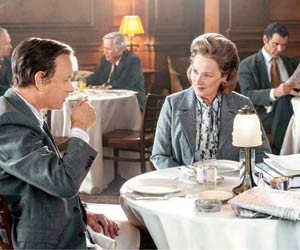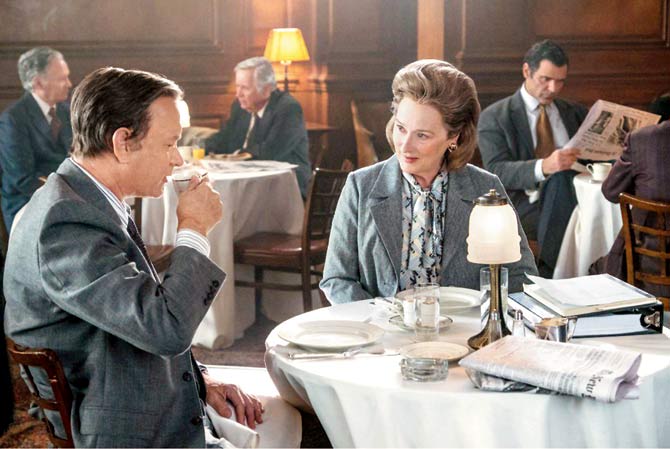2018 has only just begun, & I may have already seen the year's best film


Tom Hanks plays Washington Post editor Ben Bradlee, and Meryl Streep, his publisher Katherine Graham
 Not that I'm particularly qualified for the job, but if ever asked to host a pure journalism class, ideally for a tremendously talented bunch, the first thing I'm ever likely to recommend is for students to read the brave Washington Post editor Ben Bradlee's memoir, A Good Life, and his publisher Katherine Graham's autobiography, Personal History, even before they step into the classroom.
Not that I'm particularly qualified for the job, but if ever asked to host a pure journalism class, ideally for a tremendously talented bunch, the first thing I'm ever likely to recommend is for students to read the brave Washington Post editor Ben Bradlee's memoir, A Good Life, and his publisher Katherine Graham's autobiography, Personal History, even before they step into the classroom.
ADVERTISEMENT
The two books don't really serve as any kind of guide for writing/editing/reporting per se, which in any case is best self-learnt, on the job, in the newsroom. But few accounts are likely to inspire anyone as much, to appreciate journalism for what it is - in the famous words of Graham's husband Phil: "The first rough draft of history."
That's really for those deeply interested in the profession, from a production point of view - consumers, we all are. Who wants to get into verbose details? Well, then how about Meryl Streep as Graham - vulnerable, human, real, in ways only Streep can be. To top that, Tom Hanks as Bradlee - although, have to say, he seems (only) slightly miscast, especially when compared to Jason Robards, who played the same role in All The President's Men (1976). Both top actors in a film, visibly inspired by the brilliant memoirs of the protagonists they play on screen. That's what The Post is, which releases in theatres this Friday.
I'll take it, even more for the fact that this is also, arguably, the world's finest director, Steven Spielberg, weighing in on journalism, with every magic/movie trick in his bag to move you to tears of joy (in a couple of scenes), open your eyes (in certain others), to tell a story that otherwise inherently lacks the drama to even make it to the big screen.
The Post is essentially centred on the publication of the classified Pentagon Papers in 1971 - despite an injunction on New York Times from the US Supreme Court for the same document - which categorically proved that a series of American Presidents publicly lied about facts around the Vietnam War. This, while the US and its young were still fighting a war in Vietnam - "10 per cent" to support South Vietnam, "20 per cent" to ward off communism, and "70 per cent" to avoid global humiliation of suffering relentless defeat.
Through this, what The Post essentially explores are questions that have always been at the heart of 'First World' journalism. For one, the relationship between the proprietor and the press, and whether, if ever, it can be so clearly demarcated as between the church and the state, or the 'math' (temple) and the Mantralaya, in a democracy. Or for that matter the cozy coexistence/collusion between the press and the politician, and to what extent can one draw
a line, when both inevitably feed off each other in the pyramidal food-chain?
Beyond all of this, of course, is the First World idea of the freedom of press per se. "The only way to protect the right to publish," Bradlee rightly argues, "is to publish." There's much at stake - most of all, Graham's empire. The wily, vicious Richard Nixon heads the American state of affairs.
I reiterate First World, mainly to underline the fundamental difference between the US and India, while both are democracies. It starts with the First Amendment itself, which in the US (in 1791), curtailed the Congress from making any law whatsoever that could mess with the near-absolute freedom of press and speech.
The First Amendment of the Indian Constitution (in 1951), on the other hand, introduced riders to curtail the freedom of speech! And we don't have an over-arching 'freedom of press' - expressly mentioned as something separate from freedom of speech, expression - in the Indian Constitution to begin with.
You can tell therefore why, on matters of free speech, the US in 1791 was already a good 160 years ahead of India in 1951. Or why American journalism still inspires the world, and ought to be a textbook to teach and learn from, whether or not we've entered post-truth, or pre-lunacy. American journalism as a film genre remains my perennial favourite, and it might actually be a great way to introduce journalism as a media school module.
Besides All The President's Men (mentioned before), in order of their appearance, in case you're interested, here's a phenomenal playlist: Sidney Lumet's Network (1976), Peter Weir's The Year Of Living Dangerously (1982), Billy Ray's Shattered Glass (2003), George Clooney's Good Night, And Good Luck (2005), Peter Morgan's Frost/Nixon (2008), Michael Cuesta's Kill The Messenger (2014), Tom McCarthy's Spotlight (2015).
Sorry about the millennial bias. Orson Welles's Citizen Kane (1941) is anyway mysteriously considered the "greatest movie ever made" on every list with that title. I guess Spielberg's The Post, for its timeliness, belongs right up there too.
Mayank Shekhar attempts to make sense of mass culture. He tweets @mayankw14. Send your feedback to mailbag@mid-day.com
Download the new mid-day Android and iOS apps to get updates on all the latest and trending stories on the go
 Subscribe today by clicking the link and stay updated with the latest news!" Click here!
Subscribe today by clicking the link and stay updated with the latest news!" Click here!







